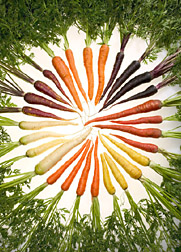This page has been archived and is being provided for reference purposes only. The page is no longer being updated, and therefore, links on the page may be invalid.
|
Read the magazine story to find out more. |
|
|
New Carrots Offer Colorful Surprises--and Health Benefits
By Erin Peabody
November 15, 2004
Researchers with the Agricultural Research Service may have found the best way to entice consumers to eat their veggies: Surprise them. They're breeding carrots that come in a palette of totally unexpected colors including yellow, dark orange, bright red--even purple.
With their flashy colors, these conventionally-bred carrots could dress up any dull meal. But what's getting scientists' attention is finding that the bright veggies are full of pigments with impressive health-promoting properties.
Xanthophylls give the yellow carrots their golden hues and have been linked with good eye health. Red carrots contain lycopene, a type of carotene also found in tomatoes that's believed to guard against heart disease and some cancers.
Purple carrots owe their color to anthocyanins. In a class all by themselves, these pigments are considered to be powerful antioxidants that can guard the body's fragile cells from the destructive effects of unstable molecules known as free radicals.
At first, Philipp Simon--the carrots' breeder who works at the ARS Vegetable Crops Research Unit in Madison, Wis.--was unsure if these complex vegetables could provide nutrients in a form that the human body can use.
But in studies with nutritionist Sherry Tanumihardjo from the University of Wisconsin in Madison, Simon found that yellow carrots' lutein was 65 percent as bioavailable as it is from a lutein supplement. The two also discovered that lycopene from red-pigmented carrots is 40 percent as bioavailable as it is from tomato paste.
And for consumers who don't like tomatoes, having another food source of lycopene would be good news.
Despite their nutritional and culinary appeal, Simon's carrots haven't yet caught on in growers' circles. But that could change as consumers create a demand for these strange, but good-for-you veggies.
Read more about the carrots in the November issue of Agricultural Research magazine.
ARS is the chief scientific research agency of the U.S. Department of Agriculture. This research was funded in part by the Initiative for Future Agriculture and Food Systems, a program of USDA's Cooperative State Research, Education and Extension Service.

